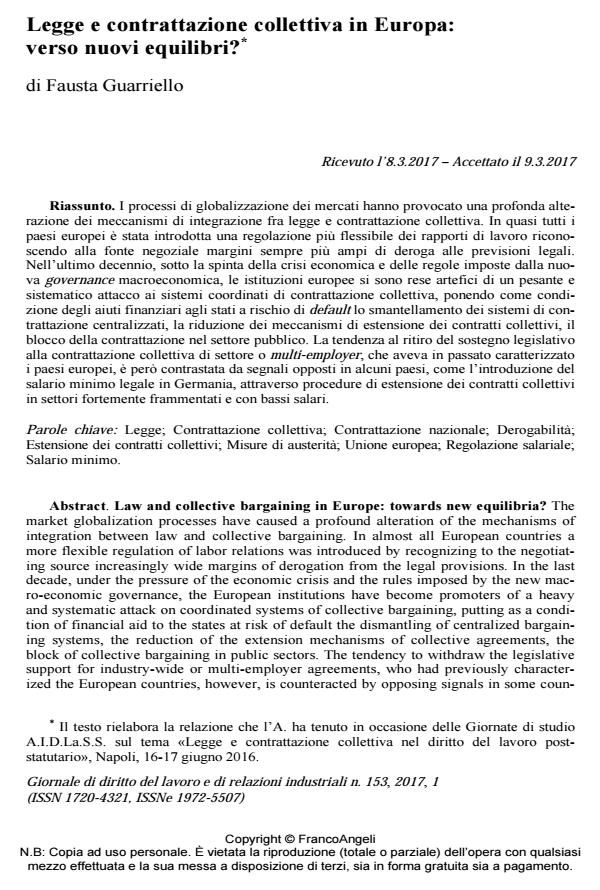Legge e contrattazione collettiva in Europa: verso nuovi equilibri?
Titolo Rivista GIORNALE DI DIRITTO DEL LAVORO E DI RELAZIONI INDUSTRIALI
Autori/Curatori Fausta Guarriello
Anno di pubblicazione 2017 Fascicolo 2017/153
Lingua Italiano Numero pagine 42 P. 97-138 Dimensione file 366 KB
DOI 10.3280/GDL2017-153006
Il DOI è il codice a barre della proprietà intellettuale: per saperne di più
clicca qui
Qui sotto puoi vedere in anteprima la prima pagina di questo articolo.
Se questo articolo ti interessa, lo puoi acquistare (e scaricare in formato pdf) seguendo le facili indicazioni per acquistare il download credit. Acquista Download Credits per scaricare questo Articolo in formato PDF

FrancoAngeli è membro della Publishers International Linking Association, Inc (PILA), associazione indipendente e non profit per facilitare (attraverso i servizi tecnologici implementati da CrossRef.org) l’accesso degli studiosi ai contenuti digitali nelle pubblicazioni professionali e scientifiche.
I processi di globalizzazione dei mercati hanno provocato una profonda alterazione dei meccanismi di integrazione fra legge e contrattazione collettiva. In quasi tutti i paesi europei è stata introdotta una regolazione più flessibile dei rapporti di lavoro riconoscendo alla fonte negoziale margini sempre più ampi di deroga alle previsioni legali. Nell’ultimo decennio, sotto la spinta della crisi economica e delle regole imposte dalla nuova governance macroeconomica, le istituzioni europee si sono rese artefici di un pesante e sistematico attacco ai sistemi coordinati di contrattazione collettiva, ponendo come condizione degli aiuti finanziari agli stati a rischio di default lo smantellamento dei sistemi di contrattazione centralizzati, la riduzione dei meccanismi di estensione dei contratti collettivi, il blocco della contrattazione nel settore pubblico. La tendenza al ritiro del sostegno legislativo alla contrattazione collettiva di settore o multi-employer, che aveva in passato caratterizzato i paesi europei, è però contrastata da segnali opposti in alcuni paesi, come l’introduzione del salario minimo legale in Germania, attraverso procedure di estensione dei contratti collettivi in settori fortemente frammentati e con bassi salari.
Parole chiave:Legge; Contrattazione collettiva; Contrattazione nazionale; Derogabilità; Estensione dei contratti collettivi; Misure di austerità; Unione europea; Regolazione salariale; Salario minimo.
- Sulla verifica di rappresentatività delle organizzazioni sindacali datoriali Andrea Lassandari, in GIORNALE DI DIRITTO DEL LAVORO E DI RELAZIONI INDUSTRIALI 153/2017 pp.1
DOI: 10.3280/GDL2017-153001 - La concertazione: prospettive euro-unitarie Fausta Guarriello, in GIORNALE DI DIRITTO DEL LAVORO E DI RELAZIONI INDUSTRIALI 172/2022 pp.703
DOI: 10.3280/GDL2021-172013 - Collective Bargaining in Labour Law Regimes Mariella Magnani, pp.357 (ISBN:978-3-030-16976-3)
- Ascesa e caduta del diritto del lavoro dell'Unione europea Stefano Giubboni, in SOCIOLOGIA DEL DIRITTO 3/2017 pp.7
DOI: 10.3280/SD2017-003001
Fausta Guarriello, Legge e contrattazione collettiva in Europa: verso nuovi equilibri? in "GIORNALE DI DIRITTO DEL LAVORO E DI RELAZIONI INDUSTRIALI " 153/2017, pp 97-138, DOI: 10.3280/GDL2017-153006